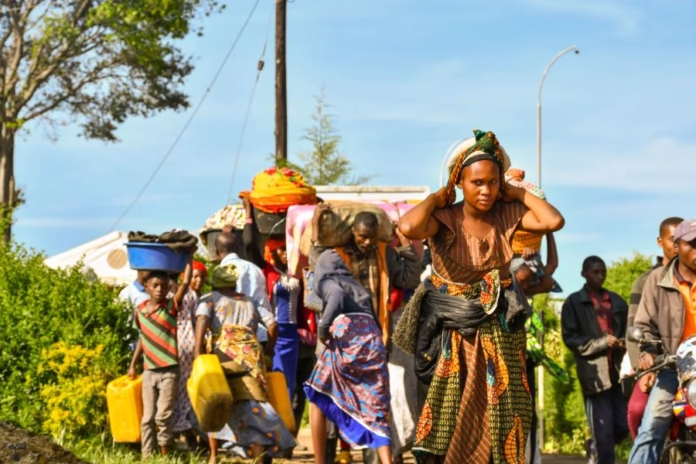The Burundian government has rejected claims from human rights activists and some media organizations that it is targeting Banyamulenge and Rwandans in Burundi. Martin Niteretse, the minister of Internal Affairs and Public Security, said during a press conference Monday, Feb. 17, 2025, that the Burundian police had conducted routine screenings of foreign nationals living in the country, particularly in Bujumbura.
“Eighty illegal foreign nationals residing in Burundi have already been arrested by the police during routine searches,” Niteretse said.
The Banyamulenge are a Tutsi ethnic minority in the Democratic Republic of the Congo (DRC) who originally come from Rwanda.
The Burundian government reports that more than 10,000 Congolese have sought refuge in Burundi due to ongoing violence in the Democratic Republic of Congo (DRC). The conflict has seen the DRC army battling the Rwandan-backed M23 rebel group, which has captured key towns in North and South Kivu in eastern DRC.
The Gatumba border, between Burundi and DRC, has become the busiest entry point in recent weeks, with thousands of Congolese fleeing the conflict. The United Nations has estimated that nearly 1,000 people have been killed in the fighting.
The Burundian government stated that refugees are being accommodated in reception centers for identification, with support from the U.N. High Commissioner for Refugees (UNHCR).
Reports from entry points between Burundi and DRC indicate three categories of people crossing the Gatumba border: Burundians based in DRC fleeing the war, Congolese entering Burundi for health reasons, and a large number of Congolese refugees escaping the violence.
“The refugees are transported in police trucks, with children and pregnant women taken in buses to the transit camp in Gihanga,” said border officials.
The northwestern province of Cibitoke has also seen an influx of refugees from DRC who crossed the Rusizi River into Buganda district. “All are checked for identification. Burundians are allowed to return to their localities, while refugees are identified and separated into soldiers and civilians,” Niteretse said.
On Monday afternoon, Niteretse met with United Nations officials to assess the unfolding situation and explore solutions for accommodating the growing number of refugees from DRC.
“The number of refugees has already exceeded 10,000. They need drinking water, shelter, and medical care,” Niteretse said. “We have agreed that, starting tomorrow, we will provide mobile toilets and food to prevent disease outbreaks caused by poor hygiene.”
Burundian authorities stated that the Congolese refugees will be transferred to camps in Rutana, Ruyigi, Cankuzo, Ngozi, and Muyinga. However, the authorities are currently overwhelmed by the scale of the crisis.
Violet Kenyana Kakyomya, the U.N. Resident Coordinator in Burundi, praised the Burundian government for its efforts in hosting refugees fleeing the conflict in eastern DRC.
According to ReliefWeb, as of Saturday, Feb. 15, 2025, the number of asylum seekers in Burundi from DRC was estimated at 15,198.
As the refugee influx continues in Burundi, the Rwandan-backed M23 rebel group has continued to capture territory in eastern DRC. A conflict that has lasted more than two decades has displaced hundreds of thousands of Congolese, with nearly 3,000 people reported killed.


